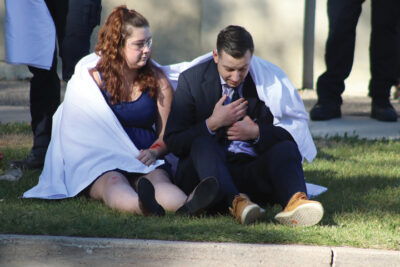Training collaboration helps emergency services hone skills
By Alejandra Pulido-Guzman on September 24, 2022.
 Herald photo by AL BEEBER
Actors in this week's mock disaster training sit outside Southminster United Church.
Herald photo by AL BEEBER
Actors in this week's mock disaster training sit outside Southminster United Church.LETHBRIDGE HERALDapulido@lethbridgeherald.com
Earlier this week, the Lethbridge Police Service and Lethbridge Fire and Emergency Services teamed up for a training scenario that taught them a few lessons.
The training scenario which took place on Wednesday involved a mock shooting incident with mass casualties over the span of about five hours.
“The exercise allowed us to test and train our ability to manage a unified command between LPS and LFES as well as our response to a mass casualty event. There were a number of things that were done very well and a few lessons that we learned,” said LPS Sgt. Denton Michelson, Critical Incident Unit tactical commander.
Michelson said the street sergeant from LPS and the captain from LFES worked well together in a vary chaotic situation.
“Unified command was established quickly, and they were able to coordinate a plan that would allow both LFES and LPS to save as many lives as possible while keeping the uninvolved public safe. In the end the tactical team was able to locate, isolate and eliminate the threat,” said Michelson.
He said they learned several lessons including the complexities of clearing a large building with limited resources.
“It was also difficult to manage a large amount of victims and witnesses with limited resources. We learned that in a mass casualty event it is vital to front-end load the incident, by dispatching as many police and paramedics as possible,” said Michelson.
He added that the training also reinforced how vital community partnerships are with organizations such as the Red Cross.
“There are many moving parts and many hands make work light. We look forward to continuing to build these relationships with our community partners,” said Michelson.
He said there are always minor improvements to make, which is why they train to identify the small inefficiencies so they can address them and be better prepared for the next time.
“We train and prepare for mass casualty events hoping they’ll never come, but if they do happen we are making sure we’re ready to respond as quickly and efficiently as possible,” said Michelson.
Follow @APulidoHerald on Twitter
14-13




